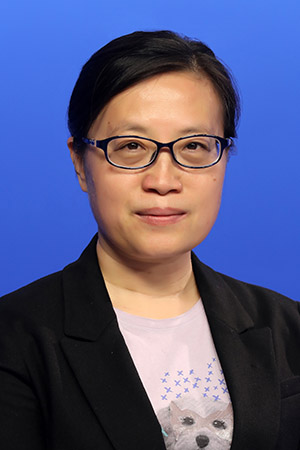
Ph.D.
Professor, Principal Investigator
Laboratory of Molecular Biology
Email: fengying@sinh.ac.cn
Tel: 86-21-54920965
Research Areas
Alternative splicing is believed to be one of the key mechanisms for enlarging the molecular diversity of higher eukaryotes and more than 95% of human genes express multiple mRNA isoforms. Many alternative splicing events are regulated at the developmental level and an increasing number of human diseases have been attributed to aberrant splicing events. We have been employing knockout/transgenic mice and multiple techniques to study the roles of deregulated alterative splicing in metabolic diseases and cancers.
Brief Biography
2017-present: Professor, Principal Investigator, Shanghai Institute of Nutrition and Health (SINH), CAS
2008-2016: Professor, Principal Investigator, Institute of Nutritional Sciences, SIBS, CAS
2008-2006: Columbia University, Associate Research Scientist
2001-2006: Columbia University, Postdoc
1998-2001: Institute of Biochemistry and Cell Biology, SIBS, CAS, PhD
1995-1998: Beijing Institute of Biological Products, the Ministry of Health, Master
Selected Publications(*Corresponding Author)
- Zheng Zhan#, Ningyang Yuan#, Xue You, Kai Meng, Rula Sha, Zhenzhen Wang, Qian Peng, Zhiqin Xie, Ruijiao Chen*, Ying Feng*. Exclusion of NUMB Exon12 Controls Cancer Cell Migration through Regulation of Notch1-SMAD3 Crosstalk. Int J Mol Sci 2022 Apr 14;23(8):4363
- Guo R, You X, Meng K, Sha R, Wang Z, Yuan N, Peng Q, Li Z, Xie Z, Chen R*, Feng Y*. Single-cell RNA sequencing reveals heterogeneity of Myf5-derived cells and altered myogenic fate in the absence of SRSF2. Adv Sci 2022 Jun;9(18):e2105775
- Sha R#, Wang Z#, You X, Liu Y, Xie Z, Feng Y*. Whole-mount Staining of Mouse Diaphragm Neuromuscular Junctions. Bio Protoc 2021 Nov 5;11(21):e4215
- Liu Y, Luo Y, Shen L, Guo R, Zhan Z, Yuan N, Sha R, Qian W, Wang Z, Xie Z, Wu W*, Feng Y*. Splicing factor SRSF1 is essential for satellite cell proliferation and postnatal maturation of neuromuscular junctions in mice. Stem Cell Reports 2020 Oct 13;15(4):941-954
- Zhang C, Shen L, Yuan W, Liu Y, Guo R, Luo Y, Zhan Z, Xie Z, Wu G, Wu W*, Feng Y*. Loss of SRSF2 triggers hepatic progenitor cell activation and tumor development in mic. Commun Biol 2020 May 5;3(1):210
- Wang Q, Wang Y, Liu Y, Zhang C, Luo Y, Guo R, Zhan Z, Wei N, Xie Z, Shen L,Wu G, Wu W, Feng Y*. U2-related proteins CHERP and SR140 contribute to colorectal tumorigenesis via alternative splicing regulation. Int J Cancer 2019 Nov 15;145(10):2728-2739
- Shen L, Han J, Wang H, Meng Q, Chen L, Liu Y, Feng Y* (co-corresponding), Wu G*. Cachexia-related long noncoding RNA, CAAlnc1, suppresses adipogenesis by blocking the binding of HuR to adipogenic transcription factor mRNAs. Int J Cancer 2019 Oct 1;145(7):1809-1821
- Wu W*, Zong J, Wei N, Cheng J, Zhou X, Cheng Y, Chen D, Guo Q, Zhang B, Feng Y*. CASH: a constructing comprehensive splice site method for detecting alternative splicing events. Brief Bioinform 2018 Sep 28;19(5):905-917
- Liu L, Luo C, Luo Y, Chen L, Liu Y, Zhang Y, Xie Z, Wu W, Wu G*, Feng Y*. MRPL33 and its splicing regulator hnRNPK are required for mitochondria function and implicated in tumor progression. Oncogene 2018 Jan 4;37(1):86-94
- Chen L, Luo C, Liu Y, Wang Q, Guo R, Zhang Y, Xie Z, Wei N, Wu W, Han J*, Feng Y*. SRSF1 prevents DNA damage and promotes tumorigenesis through regulating DBF4B pre-mRNA splicing. Cell Rep 2017 Dec 19;21(12):3406-3413
- Wei N, Feng X, Xie Z, Zhang Y, Feng Y*. Long-term di (2-ethylhexyl)-phthalate exposure promotes proliferation and survival of HepG2 cells via activation of NFκB. Toxicol In Vitro 2017 Apr 13;42:86-92
- Luo C, Cheng Y, Liu Y, Chen L, Liu L, Wei N, Xie Z, Wu W, Feng Y*. SRSF2 Regulates Alternative Splicing to Drive Hepatocellular Carcinoma Development. Cancer Res 2017 Mar 1;77(5):1168-1178
- Cheng Y, Luo C, Wu W, Xie Z, Fu X, Feng Y*. Liver-Specific Deletion of SC35/SRSF2 Caused Acute Liver Failure and Early Death in Mice. Mol Cell Biol 2016 May 16;36(11):1628-1638
- Wei N, Cheng Y, Wang Z, Liu Y, Luo C, Liu L, Chen L, Xie A, Lu Y, Feng Y*. ASF/SRSF10 plays a role in myoblast differentiation and glucose production via regulation of alternative splicing. Cell Rep 2015 Nov 24;13(8):1647-1657
- Zhou X,Li X,Cheng Y, Wu W, Xie Z, Xi Q, Han J, Wu G, Fang J, Feng Y*. BCLAF1 and its splicing regulator SRSF10 regulate tumorigenic potential of colon cancer cells. Nat Commun 2014 Aug 5;5:4581
- Li H, Cheng Y, Wu W, Liu Y, Wei N, Feng X, Xie Z, Feng Y*. SRSF10 regulates alternative splicing and is required for adipocyte differentiation. Mol Cell Biol 2014 Jun 15;34(12):2198-2207
- Zhou X, Wu W, Li H, Cheng Y, Wei N, Zong J, Feng X, Xie Z, Chen D, Manley JL, Wang H, Feng Y*. Transcriptome analysis of alternative splicing events regulated by SRSF10 reveals position-dependent splicing modulation. Nucleic Acids Res 2014 Apr;42(6):4019-4030
- Zhou X, Wu W, Wei N, Cheng Y, Xie Z, Feng Y*. Genome-wide analysis of SRSF10-regulated alternative splicing by deep sequencing of chicken transcriptome. Genomics Data 2014 Mar 12;2:20-23
- Li H, Wang Z, Zhou X, Cheng Y, Xie Z, Manley JL, Feng Y*. Binding of FUBP1 to an exonic splicing silencer and RNA secondary structure mediate second-step splicing repression. Proc Natl Acad Sci U S A 2013 Jul 16;110(29):E2687-E2695


